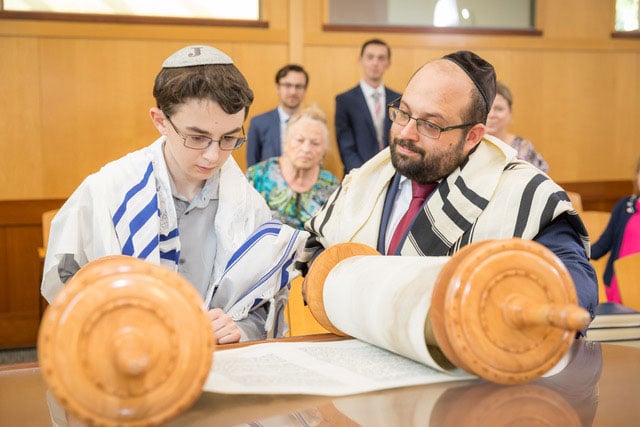 Photo courtesy of The Community Shul
Photo courtesy of The Community Shul For many people, their relationship with Judaism ends after their bar or bat mitzvah. After going through this coming of age ceremony, they become less and less engaged and eventually, unaffiliated altogether.
However, when they grow up, they still have fond memories of their bar or bat mitzvah, and they want the same for their kids. If they don’t belong to a synagogue or send their children to a religious school, they may not know how to make this happen.
That’s where the Bar and Bat Mitzvah Experience program comes in. An initiative of The Community Shul, an Orthodox synagogue in Pico-Robertson, the program offers unaffiliated Jewish families affordable Sunday school lessons and a bar and bat mitzvah ceremony.
“If these families go to any other shul or temple, they may have to take out a membership or be a member for more than one year before being admitted into the bar or bat mitzvah program,” said Rabbi Moshe Cohen of The Community Shul. “There are too many hurdles. That’s how I came up with this idea.”
The Bar and Bat Mitzvah Experience started in 2017. During the six weeks of the program, presenters from around the community, including TV writer David Sacks of The Happy Minyan, screenwriter David N. Weiss and film animator Saul Blinkoff, teach the classes. Topics range from Israel to what it means to be Jewish and the definition of a bar or bat mitzvah. The son or daughter will study with their parents, making it a family affair.
During the six weeks of the program, presenters from around the community, including TV writer David Sacks of The Happy Minyan, screenwriter David N. Weiss and film animator Saul Blinkoff, teach the classes.
“It’s your family celebration,” said Cohen. “Each bar or bat mitzvah is unique. We’ve had people from very different walks of life and nationalities including Americans, Israelis, Ethiopians and Russians. We’re doing it as a service to the broader Jewish community who otherwise couldn’t or wouldn’t do it.”
One parent, Ami Curtis, enrolled her son in the program after her family couldn’t find a temple they wanted to join. Since he enjoyed the experience so much, she then enrolled her second son in it as well.
“The speakers and teachers were fantastic and really kept the boys and girls interested,” she said. “It was really like hiding the vegetables in the food. They didn’t realize how much they were learning while listening to and interacting with these fascinating people.”
When Anya Vaysman was looking at bar and bat mitzvah options for unaffiliated children online, she found the program. It stood out because it offered a traditional approach to Judaism and it wasn’t cost-prohibitive, like other programs.
“The classes were both very educational and entertaining at the same time,” she said. “They made my son more proud of his heritage and I believe they inspired him to learn more about Judaism. In fact, when a new Jewish club opened up at his public school, he was one of the first kids to join. I am extremely grateful to The Community Shul for providing such a valuable resource for the community.”
Debbie Hirschmann, the program director for the Bar and Bat Mitzvah Experience, said that the boys and girls can do as much or as little as they are comfortable with.
“Many kids are unable, uninterested or unwilling to do all the preparation for a traditional ceremony,” she said. “We make it possible to celebrate in a meaningful, but user-friendly way.”
According to Cohen, the boys and girls don’t read the entire parsha. “Most kids haven’t been to Jewish day school,” he said. “They don’t have any religious training so it’s too difficult for them to do.”
The goal is not to have a perfect ceremony but, instead, to inspire the teens to stay connected to Judaism even when the celebrations are over.
“We hope this program accomplishes planting a seed,” Hirschmann said. “[We’re] planting a positive connection to Judaism, and [they’re] seeing that Judaism can be a positive, relevant and meaningful part of their lives.”





















 More news and opinions than at a Shabbat dinner, right in your inbox.
More news and opinions than at a Shabbat dinner, right in your inbox.